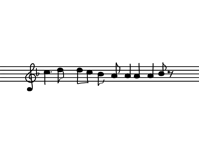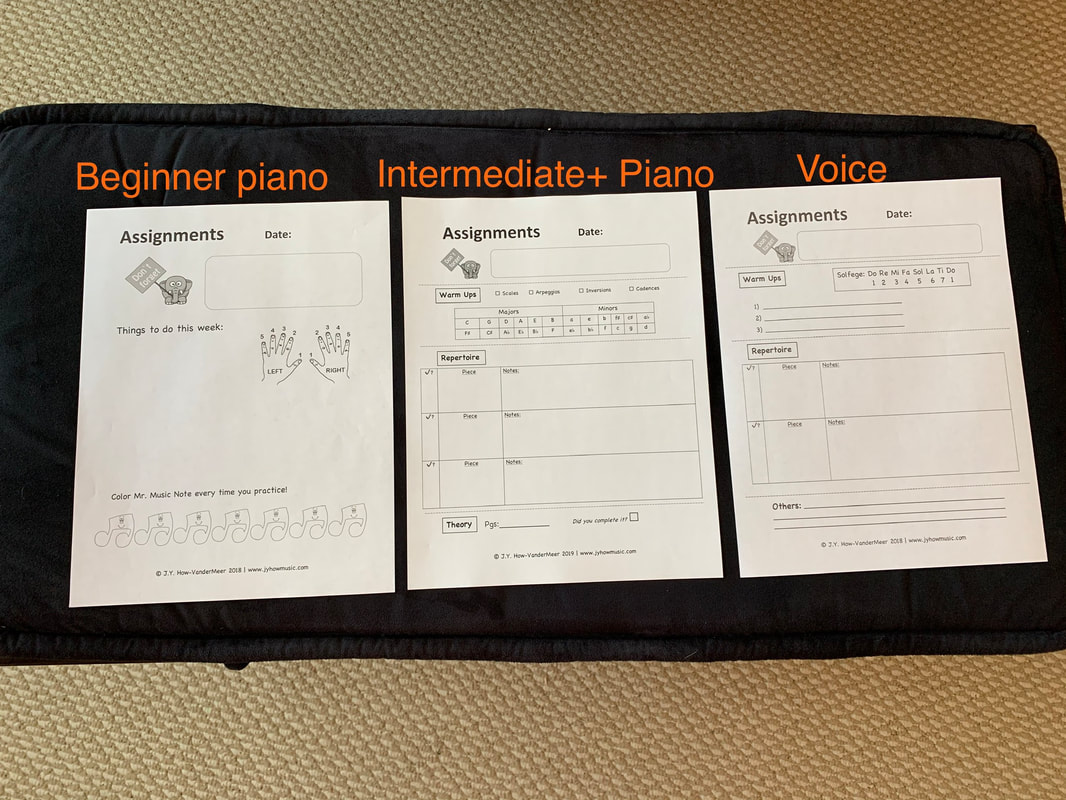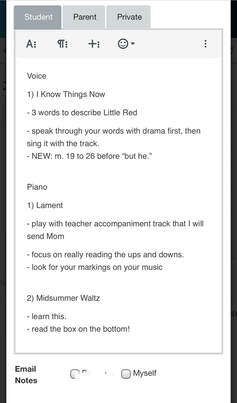|
Teacher-Student-Parent. Independent Learning Even though one of my studio's mission is to "Create Independent Leaners", most beginner students are not ready to be independent because of their age. Parental encouragement at home is much needed, especially when I only see them 30 or 45mins a week. For kids who respond well to routine, having a daily practice schedule helps them get into the rhythm (ha, musical pun!) of going to the piano or intentionally singing everyday. I do not have a required amount of practice time in my policies because every student is so different! My minimum expectation is that weekly assignments are completed. By completed I mean they are able to play/sing with accuracy and confidence. For parents who like to be involved in their learning, write down notes as you hear me teach your kids. I write down each student's assignments - whether it's in assignment sheets in their binder, or in their attendance on the My Music Staff portal which is then emailed to parents, but just like school work, most students need the reminder to check for themselves what is written down. As much as I encourage parental involvement, I still ask for them to let me take the reins when working with each student. Parents are welcome to sit in at our lessons, but I kindly ask to not be interrupted. Some kids lack the confidence and look to their parent(s) for answers when I ask them a question. In the long run, that prevents the student and I from having a relationship - something that is so valuable and important when it comes to one-on-one lessons such as ours! I do my best to learn about each student - their personality, their quirks, what they respond well to, what they don't respond well to, what kind of music motivates them, what cheers them up, what bores them etc., and I consider that a part of my job. I can't (and shouldn't) fit every student into the same mold, and that is why developing the teacher-student relationship is vital.
What Happens At Home Stays at home, ha! Jokes aside, how much musical activity - listening to music, going to concerts, practicing their pieces - they have at home definitely relates to their musical journey. How much practice they have at home affects the results of their learning. Most of my students learn "for leisure", but that's not saying that there isn't work that is put into it. I will work with whatever goals you have (a question I ask at Sample Lessons, actually), but we have got to work together to achieve those goals. The Student Whether my student is a child or an adult, the have the same job - to learn and to work on what they have learned! (Psst... I have the same job too when I go to my teacher for lessons. Still!) Encourage them to ask lots of questions, or ask if they are confused about what I am saying. As cliché as "Practice Makes Perfect" sounds, it's mostly right. I say "mostly" because there is never going to be a "perfect" for music. It is an art form. 5 pianists' interpretations on Mozart's Sonata No. 10 in C Major K. 330 or 6 different singers' take on Handel's "Let the Bright Seraphim" from Samson are going to be entirely different from one another. Who is to say which one is "perfect?" However! There is accuracy - notes, rhythms, style etc. to aim for, so I would say it is more like "Practice Makes Accurate." My Job Is to guide. I do not claim to know everything about music as I continue to learn myself. It's a lifelong journey. I do, however, know enough to do my job well. Families pay me for my expertise, and I appreciate their trust in me helping them/their child glean as much musical knowledge and skills as they can from me. As I mentioned above, I do my best to learn about each student and tailor how I teach accordingly. That is why I find a Sample Lesson important. It is where we can kind of have a glimpse of whether we will be a good fit, and a chance for us to lay goals and expectations out on the table for discussion. Which leads me to... Communication I cannot emphasize how important this is! Piano and Voice lessons are so personal, and communication really is key. Yes, it is a business, but in the middle of it are relationships that has to work well together for lessons to be as successful as they potentially can be. During the summer, I (as most teachers do) plan out the next school year. That includes securing dates for different musical activities - Studio Classes, Festivals, and Recitals - so that families can plan accordingly as well. The Calendar, a Newsletter, and the latest Studio Policies are distributed via email to the whole studio and are also uploaded to the studio's website. Most of the time when the need to communicate with the entire studio arises, I send a mass email. If it is just with one family, texts are welcome and I get back during my business hours. I welcome any questions that parents have, and especially appreciate ample notice when a student can't make it for a lesson. I truly understand busy lives, but I would rather try to work something out with families than completely missing a lesson! Perhaps I over-communicate, but I like to let parents know how each student did at the end of our lesson and what they need to do at home for the week. I keep it brief, probably just a couple of minutes, but it allows the parents to know what we accomplished and how the student is progressing. My favorite thing to do, though? Is when a student has such a good handle on a piece or a song, and we do a teeny-weeny recital of that for the parent when they come to pick them up! I started teaching in 2007. Though my age puts me in the Young Teacher category and there is always plenty to learn, I have taught long enough to see how wonderful the results of a solid Trinity Relationship can be!
2 Comments
|



 RSS Feed
RSS Feed